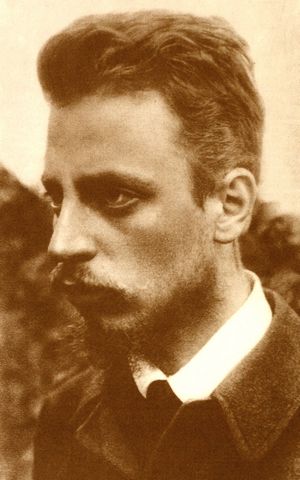Dzieło

Malte
Rainer Maria RilkeRainer Maria Rilke słynne cytaty
Źródło: Już wszystkie rzeczy…, w: Wiersze rozproszone i pośmiertne z lat 1906–1926, wybrał i przełożył Bernard Antochewicz, Wrocław 1991.
Rainer Maria Rilke Cytaty o ludziach
Denn Verse sind nicht, wie die Leute meinen, Gefühle (die hat man früh genug), – es sind Erfahrungen. (niem.)
Źródło: Zapiski Maltego Lauridsa Brigge
Źródło: Malte. Pamiętniki Malte-Lauridsa Brigge, tłum. Witold Hulewicz.
Rainer Maria Rilke Cytaty o miłości
O Herr, gib jedem seinen eignen Tod,
das Sterben, das aus jenem Leben geht,
darin er Liebe hatte, Sinn und Not.
Denn wir sind nur die Schale und das Blatt.
Der große Tod, den jeder in sich hat,
das ist die Frucht, um die sich alles dreht. (niem.)
Źródło: Księga godzin, O ubóstwie i śmierci, wyd. L. Chomińskiego, Wilno 1935, s. 140–141, tłum. Witold Hulewicz.
Rainer Maria Rilke cytaty
Źródło: List do młodego poety
„Zgaś moje oczy: ja Cię widzieć mogę,
uszy zatrzaśnij: ja Ciebie usłyszę…”
Lösch mir die Augen aus: ich kann dich sehn,
wirf mir die Ohren zu: ich kann dich hören… (niem.)
Źródło: Księga godzin, O pielgrzymstwie, wyd. L. Chomińskiego, Wilno 1935, s. 90, tłum. Witold Hulewicz.
Źródło: Malte. Pamiętniki Malte-Lauridsa Brigge, tłum. Witold Hulewicz.
Źródło: Przypomnienie, tłum. Mieczysław Jastrun
Źródło: Pieśń miłosna, tłumaczenie Adam Pomorski
„Kto teraz płacze gdziekolwiek na świecie,
bez powodu płacze na świecie,
płacze nade mną.”
Źródło: tom Godzina powagi, tłum. Janina Brzostowska
Rainer Maria Rilke: Cytaty po angielsku
“Let everything happen to you: beauty and terror. Just keep going. No feeling is final.”
from poem Go to the Limits of Your Longing.
Appears in movie Jojo Rabbit.
Wariant: Let everything happen to you
Beauty and terror
Just keep going
No feeling is final
“Have patience with everything that remains unsolved in your heart.
… live in the question.”
Źródło: Letters to a Young Poet
Letter One (17 February 1903)
Letters to a Young Poet (1934)
Kontekst: No one can advise or help you — no one. There is only one thing you should do. Go into yourself. Find out the reason that commands you to write; see whether it has spread its roots into the very depths of your heart; confess to yourself whether you would have to die if you were forbidden to write.
Letter Three (23 April 1903)
Letters to a Young Poet (1934)
First Elegy (as translated by Stephen Mitchell)
Źródło: Duino Elegies (1922)
Kontekst: Who, if I cried out, would hear me among the angels'
hierarchies? and even if one of them
pressed me against his heart: I would be consumed
in that overwhelming existence. For beauty is nothing
but the beginning of terror, which we still are just able to endure,
and we are so awed because it serenely disdains
to annihilate us. Every angel is terrifying.
“You, Beloved, who are all
the gardens I have ever gazed at,
longing.”
You Who Never Arrived, as translated by Stephen Mitchell
Kontekst: You, Beloved, who are all
the gardens I have ever gazed at,
longing. An open window
in a country house —, and you almost
stepped out, pensive, to meet me.
Streets that I chanced upon,—
you had just walked down them and vanished.
And sometimes, in a shop, the mirrors
were still dizzy with your presence and, startled,
gave back my too-sudden image. Who knows?
perhaps the same bird echoed through both of us
yesterday, separate, in the evening...
Letter Seven (14 May 1904)
Letters to a Young Poet (1934)
Kontekst: People have (with the help of conventions) oriented all their solutions toward the easy and toward the easiest side of the easy; but it is clear that we must hold to what is difficult; everything alive holds to it, everything in Nature grows and defends itself in its own way and is characteristically and spontaneously itself, seeks at all costs to be so and against all opposition. We know little, but that we must hold to what is difficult is a certainty that will not forsake us; it is good to be solitary, for solitude is difficult; that something is difficult must be a reason the more for us to do it.
To love is good, too: love being difficult. For one human being to love another: that is perhaps the most difficult of all our tasks, the ultimate, the last test and proof, the work for which all other work is but preparation.
“When you go to bed, don't leave bread or milk
on the table: it attracts the dead.”
Sonnet 6 (as translated by Edward Snow)
Sonnets to Orpheus (1922)
Źródło: Translations from the Poetry of Rainer Maria Rilke
Letter Seven (14 May 1904)
Letters to a Young Poet (1934)
Wariant: For one human being to love another human being: that is perhaps the most difficult task that has been given to us, the ultimate, the final problem and proof, the work for which all other work is merely preparation.
Źródło: The Selected Poetry of Rainer Maria Rilke
Kontekst: People have (with the help of conventions) oriented all their solutions toward the easy and toward the easiest side of the easy; but it is clear that we must hold to what is difficult; everything alive holds to it, everything in Nature grows and defends itself in its own way and is characteristically and spontaneously itself, seeks at all costs to be so and against all opposition. We know little, but that we must hold to what is difficult is a certainty that will not forsake us; it is good to be solitary, for solitude is difficult; that something is difficult must be a reason the more for us to do it.
To love is good, too: love being difficult. For one human being to love another: that is perhaps the most difficult of all our tasks, the ultimate, the last test and proof, the work for which all other work is but preparation.

“I live my life in widening circles that reach out across the world.”
Źródło: Rilke's Book of Hours: Love Poems to God
“The work of the eyes is done. Go now and do the heart-work on the images imprisoned within you.”
Wendung (Turning Point), as translated by Stephen Mitchell
As quoted in Sunbeams : A Book of Quotations (1990) by Sy Safransky, p. 42
“Ah, how good it is to be among people who are reading.”
Źródło: The Notebooks of Malte Laurids Brigge
